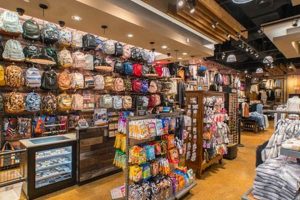An establishment specializing in skateboarding equipment and apparel located on Rose Street, it provides goods tailored to the skateboarding community. These items include skateboards (complete and component parts), shoes designed for skateboarding, protective gear, and clothing from brands popular within skate culture.
Such a venue offers significant advantages to skateboarders. It provides a physical space to examine products, receive expert advice from knowledgeable staff, and connect with fellow enthusiasts. The presence of this type of business can foster a sense of community and contribute to the local skateboarding scene’s growth by offering specialized equipment that might not be available at general sporting goods stores and serves as a hub for local events.
The following sections will delve into specific aspects of skate shops, including product selection, customer service, community involvement, and the role they play in supporting the overall skateboarding industry. This will provide a more detailed understanding of the factors contributing to their significance.
Skateboarding Guidance
This section presents guidance applicable to skateboarders of various skill levels. The following advice is intended to promote safety, skill development, and enjoyment of the sport.
Tip 1: Equipment Inspection: Prior to each session, a thorough examination of the skateboard is crucial. Check wheels for wear and secure mounting. Ensure truck bolts are tightened appropriately to prevent instability. A compromised board poses a significant risk of injury.
Tip 2: Protective Gear Utilization: Helmets are non-negotiable, irrespective of skill level. Knee and elbow pads offer significant protection against common injuries. Wrist guards can mitigate the risk of wrist fractures during falls. Consistent use of protective gear is a responsible practice.
Tip 3: Gradual Skill Progression: Attempting advanced maneuvers prematurely can lead to accidents. Start with fundamental skills, such as pushing, turning, and maintaining balance. Gradually introduce more complex tricks as proficiency increases. This fosters a sustainable learning curve.
Tip 4: Terrain Assessment: Before skating in a new location, carefully evaluate the surface. Look for cracks, debris, or obstacles that could impede progress or cause falls. Consider the slope and overall suitability of the terrain for skateboarding.
Tip 5: Awareness of Surroundings: Maintaining situational awareness is paramount. Be mindful of pedestrians, vehicles, and other skaters. Avoid skating in crowded areas where collisions are likely. Prioritize safety and respect the environment.
Tip 6: Proper Footwear: Skate shoes are designed with flat, grippy soles that enhance board feel and control. Avoid wearing running shoes or other footwear with excessive cushioning or tread, as this can impair your ability to control the board.
Adherence to these guidelines contributes to a safer and more rewarding skateboarding experience. Prioritizing preparation, safety, and gradual progression maximizes enjoyment while minimizing potential risks.
The subsequent section will conclude the article, summarizing key points and offering a final perspective on the significance of skateboarding.
1. Product Variety
The concept of product variety is central to the success and appeal of any skate shop. The breadth and depth of available items directly influence customer satisfaction, brand perception, and the ability to cater to a diverse range of skateboarding needs and preferences.
- Skateboards: Completes and Components
A comprehensive selection of complete skateboards, catering to various skill levels and riding styles, is essential. This includes boards suited for street skating, park skating, and cruising. Furthermore, offering a wide array of individual components decks, trucks, wheels, bearings, hardware, and grip tape allows skaters to customize their setups to precise specifications. This component selection needs to encompass different brands, materials, and performance characteristics to accommodate nuanced rider preferences.
- Footwear
Skateboarding footwear requires specialized design features for durability, board feel, and impact protection. Stocking a diverse range of skate shoes from reputable brands is crucial. This involves offering different styles (low-top, mid-top, high-top), materials (suede, canvas, leather), and technologies (reinforced ollie pads, cupsole vs. vulcanized construction) to meet the varied demands of skateboarding. Including sizes for all customers and stocking frequently requested models is part of product variety.
- Protective Gear
Providing a comprehensive selection of protective gear underscores a commitment to safety and caters to skaters of all ages and experience levels. This includes helmets (various sizes and certifications), knee pads, elbow pads, wrist guards, and mouthguards. Offering a range of brands, styles, and price points allows customers to select gear that balances protection with comfort and budget considerations. Properly informing customers about protective gear is essential.
- Apparel and Accessories
Beyond essential skateboarding equipment, apparel and accessories contribute significantly to a skate shop’s overall appeal. Stocking a variety of t-shirts, hoodies, pants, hats, and socks from skate-related brands enhances the shop’s identity and provides customers with opportunities to express their affiliation with skate culture. Accessories such as backpacks, wallets, belts, and stickers further broaden the product offering and cater to a wider range of customer needs.
In conclusion, a well-curated product variety is a defining characteristic of a successful skate shop. It not only caters to the diverse needs and preferences of the skateboarding community but also establishes the shop as a trusted destination for quality equipment and authentic skate culture. The ability to offer a comprehensive selection, coupled with expert knowledge and a commitment to customer satisfaction, is paramount to long-term success.
2. Expert Staff
The presence of knowledgeable personnel is a critical determinant of the success and reputation of a skate shop. Staff members with in-depth understanding of skateboarding equipment, techniques, and culture directly impact customer experience and loyalty. Their expertise enables them to provide informed guidance, assisting customers in selecting appropriate products and offering valuable advice on skateboarding techniques, safety, and equipment maintenance. A skilled staff transforms a retail space into a valuable resource for the local skateboarding community.
The impact of expert staff can be observed in several practical scenarios. For example, a customer seeking a new skateboard deck may benefit from the staff’s knowledge of different deck materials, shapes, and sizes, ensuring they choose a deck suited to their riding style and skill level. Similarly, a beginner skateboarder can receive valuable instruction on fundamental skills and safety precautions, fostering a positive and safe introduction to the sport. Furthermore, expert staff can diagnose equipment issues, providing repair services or recommending appropriate replacement parts, thus prolonging the lifespan of skateboarding equipment and reducing costs for customers. Staff also serve as a source of reliable information amidst potentially misleading information on the internet or from inexperienced peers.
The investment in and development of expert staff represents a strategic advantage for a skate shop. It differentiates the establishment from generic retailers and online vendors, offering a personalized and informative customer experience. While challenges exist in attracting and retaining qualified personnel, the benefits of a knowledgeable staff in terms of customer satisfaction, community engagement, and overall business success are substantial. This directly enhances the skate shop’s role as a central component of the local skateboarding ecosystem.
3. Community Hub
The designation of a skate shop, such as one situated on Rose Street, as a “community hub” signifies its function beyond a mere retail outlet. It implies a central gathering point for skateboarders, fostering social interaction, skill-sharing, and a sense of collective identity. The establishment’s physical space becomes a locus for individuals united by a common passion, generating benefits for both the participants and the business itself. This connection creates an environment where informal mentorship occurs, experienced skateboarders guide novices, and a shared culture of mutual support emerges. Such dynamics are instrumental in propagating skateboarding culture and attracting new adherents to the sport.
A practical example of this dynamic can be observed in organized events hosted by the shop. These events, such as skateboarding competitions, demonstrations, or workshops, not only draw crowds but also strengthen the community’s bonds. These gatherings provide opportunities for skaters to showcase their skills, learn from one another, and forge relationships. Furthermore, the shop’s active involvement in the local skateboarding scene enhances its reputation and fosters customer loyalty. By providing a space for social interaction, the shop cultivates a sense of belonging that transcends the transactional relationship between retailer and consumer. This involvement also extends to supporting local skate parks and advocating for skateboarding-friendly infrastructure.
The strategic implementation of community-building initiatives poses challenges, requiring sustained effort and a genuine commitment to fostering inclusivity. A successful “community hub” must be welcoming to individuals of all skill levels, backgrounds, and ages. Despite these challenges, the cultivation of a strong community base provides a tangible competitive advantage, differentiating the establishment from purely commercial entities and ensuring its long-term viability within the local skateboarding ecosystem. Understanding this role is crucial for sustaining the activity and attracting future skaters.
4. Local Events
The active involvement in local events serves as a vital component in the strategy of a skate shop. These events not only promote the business but also contribute significantly to the community’s skateboarding culture, reinforcing the shop’s position within that community.
- Competitions and Contests
Organizing or sponsoring skateboarding competitions attracts participants and spectators alike. These events provide a platform for skateboarders to showcase their abilities and foster a spirit of competition. For a skate shop, these events increase visibility, generating brand awareness and potential sales through event-related merchandise or promotion.
- Demonstrations and Workshops
Arranging demonstrations by professional skateboarders and workshops for various skill levels can enhance a skate shop’s reputation as a knowledge center. Demonstrations inspire and entertain, while workshops offer practical instruction and foster skill development. These activities attract customers to the shop, creating engagement opportunities and promoting skateboarding culture.
- Community Skate Days
Hosting community skate days fosters inclusivity by providing a welcoming environment for skateboarders of all abilities. These events may include free skate sessions, beginner lessons, and informal competitions. Community skate days create a positive association with the skate shop, encouraging repeat visits and word-of-mouth referrals.
- Collaborations with Local Organizations
Partnering with local schools, community centers, and non-profit organizations to host skateboarding-related events expands the reach and impact of a skate shop. These collaborations may involve fundraising activities, equipment drives, or skateboarding safety clinics. Such partnerships reinforce the shop’s commitment to community engagement and social responsibility.
The effective integration of local events into a skate shop’s marketing strategy not only enhances its brand visibility and customer engagement but also strengthens its ties to the community. By providing opportunities for skateboarders to connect, learn, and compete, the shop solidifies its role as a vital component of the local skateboarding landscape. These efforts contributes to community growth and benefits the associated shop.
5. Skate Culture
The connection between skate culture and a retail establishment such as one located on Rose Street is symbiotic and fundamental. Skate culture, characterized by its distinctive style, music, art, and values of independence and self-expression, directly influences the products offered, the marketing strategies employed, and the overall atmosphere of the shop. The establishment, in turn, acts as a conduit for disseminating and perpetuating skate culture within the local community. For example, a shop that stocks apparel from independent skate brands, displays artwork from local skate artists, and plays music favored within the skate scene actively reinforces cultural identity.
The importance of skate culture to such a business stems from its ability to create a sense of belonging and loyalty among customers. A skater is more likely to patronize a shop that understands and reflects their values. This manifests in the shops support for local skaters, its sponsorship of local events, and its commitment to providing a space where skaters feel welcome and understood. Consider a scenario where the establishment actively supports local skate park initiatives or hosts video premieres featuring local skaters; this solidifies its position as an authentic and integral part of the skate community. Additionally, stocking hard-to-find items that are central to skate culture such as specific board models or shoe collaborations further solidifies customer loyalty.
Understanding this connection is practically significant for a business aspiring to serve the skateboarding community. Authenticity is paramount. A business that attempts to superficially adopt elements of skate culture without genuine engagement risks alienating its target audience. Challenges in maintaining authenticity include balancing commercial needs with the core values of skate culture, which often prioritizes independence and anti-establishment sentiment. A commitment to supporting the local skateboarding community through authentic engagement ensures long-term viability and reinforces the business’s role as a cultural touchstone.
6. Reputation
Reputation serves as a critical intangible asset influencing consumer perception and purchase decisions regarding Rose Street Skate Shop. It reflects the cumulative experiences and opinions of past and present customers, vendors, and the broader skateboarding community. A positive reputation enhances trust, attracts new clientele, and fosters long-term loyalty, while a negative reputation can deter customers and damage the business’s viability.
- Customer Reviews and Testimonials
Online reviews and customer testimonials directly shape perceptions of service quality, product reliability, and overall customer satisfaction. Positive reviews on platforms such as Google, Yelp, or the shop’s website create a favorable impression, indicating trustworthiness and reliability. Conversely, negative reviews highlighting poor service, defective products, or unresolved complaints can deter potential customers and necessitate reputation management efforts. Example: Consistent positive feedback regarding knowledgeable staff and high-quality skateboard components directly contributes to a positive reputation.
- Community Involvement and Sponsorship
Active participation in local skateboarding events, sponsorships of local skaters or teams, and support for community initiatives enhances reputation by demonstrating a commitment beyond mere commercial interests. Such involvement signals authenticity and aligns the shop with the values of the skateboarding community. Example: Sponsoring a local skateboarding competition and providing prizes or resources showcases a commitment to the local scene, fostering goodwill and enhancing the shop’s reputation.
- Word-of-Mouth Referrals
Positive word-of-mouth referrals, generated through exceptional customer service and product quality, contribute significantly to reputation. Skateboarders often rely on recommendations from peers and respected figures within the community. A strong reputation fosters a network of advocates who promote the shop organically. Example: A satisfied customer recommending Rose Street Skate Shop to a friend due to their positive experience directly strengthens the shop’s reputation within the skateboarding community.
- Brand Image and Authenticity
Maintaining a consistent brand image that reflects the values and aesthetics of skateboarding culture is vital. Authenticity, demonstrated through genuine engagement with the community and a commitment to quality products, reinforces a positive reputation. A perceived lack of authenticity can damage reputation and erode trust. Example: Selling products from established and respected skateboarding brands, rather than generic or unrelated items, reinforces a commitment to authenticity and enhances the shop’s reputation.
The aggregate impact of customer reviews, community involvement, word-of-mouth referrals, and brand authenticity contributes to the overall reputation of Rose Street Skate Shop. Proactive management of these elements is essential for sustaining a positive image, attracting new customers, and fostering long-term loyalty within the skateboarding community. A strong reputation directly translates into increased business and sustained success.
7. Online Presence
For Rose Street Skate Shop, a robust online presence extends beyond a mere website; it serves as a digital storefront, a marketing channel, and a community engagement platform. Its relevance lies in expanding the shop’s reach beyond its physical location and catering to a broader audience, particularly in an era dominated by e-commerce.
- E-Commerce Functionality
The integration of e-commerce capabilities enables the shop to sell products online, expanding its customer base beyond local patrons. This functionality includes secure payment processing, inventory management, and shipping logistics. A well-designed online store allows customers to browse products, place orders, and track shipments efficiently. For example, offering a complete range of skateboards, components, and apparel online mirrors the in-store selection, providing convenience to customers who may not be able to visit the physical location. The absence of e-commerce limits revenue potential and restricts accessibility.
- Social Media Engagement
Active engagement on social media platforms, such as Instagram, Facebook, and Twitter, facilitates direct communication with customers and fosters community interaction. Sharing content related to skateboarding culture, product updates, events, and promotions enhances brand visibility and drives traffic to the online store or physical location. For instance, posting videos of local skateboarders using shop-supplied equipment or announcing upcoming workshops creates engagement and reinforces the shop’s connection to the community. Inactive social media presence diminishes brand awareness and limits communication opportunities.
- Search Engine Optimization (SEO)
Implementation of effective SEO strategies ensures that Rose Street Skate Shop’s website appears prominently in search engine results when potential customers search for skateboarding-related products or services. This involves optimizing website content, using relevant keywords, and building backlinks from reputable websites. For example, targeting keywords such as “skateboard shop near me” or “best skateboards” increases organic traffic and drives qualified leads. Poor SEO ranking reduces visibility and limits the shop’s ability to attract new customers through online search.
- Content Marketing
Creation and distribution of valuable content, such as blog posts, articles, and videos, establishes the skate shop as a trusted source of information within the skateboarding community. Content marketing attracts potential customers, enhances brand authority, and drives traffic to the website. For example, publishing articles on skateboarding techniques, equipment maintenance, or local skate park reviews provides value to customers and reinforces the shop’s expertise. A lack of engaging content limits brand authority and reduces opportunities for customer engagement.
By strategically leveraging e-commerce, social media, SEO, and content marketing, Rose Street Skate Shop can cultivate a thriving online presence that complements its physical location. This integrated approach maximizes reach, enhances customer engagement, and drives sustainable growth within the competitive skateboarding market.
Frequently Asked Questions
The following section addresses common inquiries pertaining to Rose Street Skate Shop. This information is intended to provide clarity regarding policies, products, and services.
Question 1: What types of skateboarding equipment are stocked?
Rose Street Skate Shop maintains an inventory of complete skateboards, decks, trucks, wheels, bearings, hardware, grip tape, and protective gear. Various brands and price points are represented to accommodate diverse skill levels and preferences.
Question 2: Does Rose Street Skate Shop offer skateboard repair services?
Basic skateboard repair services are provided, including bearing replacement, grip tape application, and truck mounting. Complex repairs may require evaluation and potential referral to specialized technicians.
Question 3: Is it possible to order products online?
Rose Street Skate Shop offers online ordering through its website. Shipping is available within a specified geographical area. Details regarding shipping costs and delivery times are outlined on the website.
Question 4: What is the return policy for purchased items?
Unused items in original packaging may be returned within a specified timeframe, subject to certain conditions. A receipt is required for all returns. Specific details regarding the return policy are available on the shop’s website or at the point of sale.
Question 5: Does Rose Street Skate Shop sponsor local skateboarders?
Rose Street Skate Shop maintains a sponsorship program for select local skateboarders. Sponsorship opportunities are evaluated based on skill level, community involvement, and alignment with the shop’s brand values.
Question 6: What measures are in place to ensure product authenticity?
Rose Street Skate Shop sources its products directly from reputable manufacturers and distributors to ensure authenticity and quality. Counterfeit products are not knowingly stocked or sold.
This FAQ section provides a concise overview of key information regarding Rose Street Skate Shop. For more detailed information, customers are encouraged to consult the shop’s website or contact staff directly.
The subsequent section will conclude the article with final thoughts.
Conclusion
This exploration has examined the multifaceted role a skate shop, specifically one located on Rose Street, plays within the skateboarding community. Factors such as product variety, expert staff, community engagement, local event support, embodiment of skate culture, reputation management, and a functional online presence have been identified as critical determinants of its success and influence.
The enduring value of establishments like Rose Street Skate Shop lies in their ability to foster community, provide expertise, and uphold the values of skateboarding culture. Continued support for these local businesses ensures the health and vibrancy of the skateboarding landscape for future generations. The commitment to quality and community impact is imperative for continued growth.







